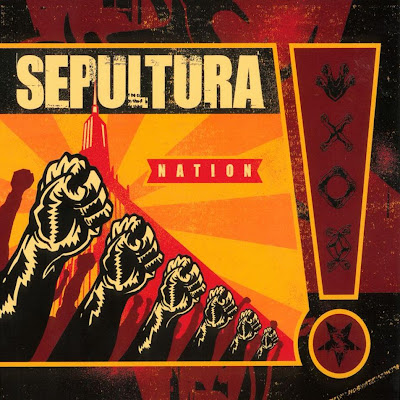
.jpg)
Sepultura’s decline was noticeable, as their album sales paled in comparison to those of Cavalera’s Soulfly, and the nadir of their illustrious history had to have been when the band found themselves without an American record label after their 2001 album Nation. Sepultura bravely decided to soldier on, replacing Cavalera with American vocalist Derrick Green, but much like when Blaze Bayley took over as singer for Iron Maiden in the mid-’90s, the resulting albums, while not awful by any stretch, were still nowhere near as great as their predecessors.

So when your singer takes off after releasing six pivotal albums, what the heck do you do? After perfecting the more progressive side of thrash metal on the albums Beneath the Remains and Arise, they took a more stripped-down, aggro approach on 1993’s politically-charged Chaos A.D., and in 1996, released Roots, which not only combined metal with native Brazilian instrumentation (something that Cavalera would continue to do in subsequent years with Soulfly), but proceeded to become a pivotal recording in the burgeoning nu-metal genre. Up until then, Sepultura had emerged as one of the world’s greatest metal acts, a band whose continuing evolution always kept them one step ahead of the pack. That’s just the conundrum Brazilian metal pioneers Sepultura found themselves in when vocalist/guitarist/visionary Max Cavalera quit the band in late 1996.

When Roorback came out during the summer of 2003, Sepultura had been together for 19 years - and this compelling disc finds them very much on top of their game after almost two decades in the metal field.It’s never easy for a band to replace a lead vocalist, let alone a much-loved metal band considered by many to be one of the greatest to come out of the late ’80s and early ’90s.

Sepultura successfully give U2's gem a ferocious alternative metal makeover, and Bono's dark lyrics are right at home on this politically charged CD. The songs that Sepultura wrote for Roorback paint a consistently bleak and troubling picture of the world - one that is only reinforced by an unlikely remake of U2's "Bullet the Blue Sky" appended to the album. Unrest and political corruption are recurring themes on Roorback American singer Green and his Brazilian colleagues spare no anger on incendiary tracks like "Mind War," "Apes of God," and the crushing opener, "Come Back Alive" (which is about surviving the horrors of wartime combat). Green is passionate and focused throughout the album - he has no problem going that extra mile - and the writing is consistently strong. And if there are still any lingering doubts about the Green/Sepultura match, 2003's excellent Roorback should put them to rest for good. If 1998's mildly uneven Against - Sepultura's first album with Green - found the band struggling with the transition, Green was filling Cavalera's shoes much more confidently on 2001's Nation. Sepultura experienced a major loss when former lead singer Max Cavalera left to form Soulfly in 1996, but thankfully, Derrick Green proved to be a highly capable replacement. Some bands will bounce back - AC/DC, for example, sounded better than ever when they hired Brian Johnson after Bon Scott's untimely death - while others will suffer a creative decline. Losing a lead singer can be incredibly disruptive for a band.


 0 kommentar(er)
0 kommentar(er)
